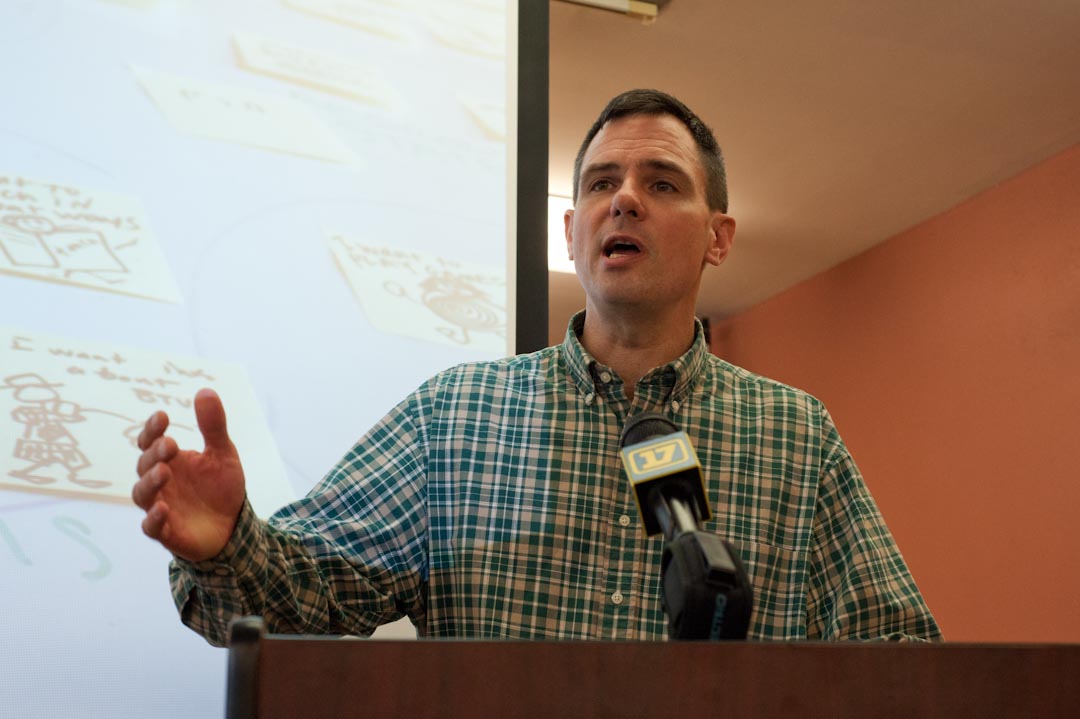Burlington’s Civic Cloud is now up and running, according the members of the Civic Cloud Collaborative. The volunteer-run group hosted a press conference on Wednesday, June 11, to report their progress.
“The Civic Cloud is a platform for public, non-commercial Internet applications and digital creative works,” Code for BTV Captain Bradley Holt said. “It’s built on the city’s fiber-optic gigabit network, it provides Internet speeds of over 100 times the average national broadband speed.”
Recently the Civic Cloud was installed in the Burlington Telecom colocation facility.
“Applications already running on the Civic Cloud include high-definition live-streaming of public meetings and cultural events, a collection of volunteer-developed applications that preserve and promote Vermont-made music, and a multi-user educational game about the Lake Champlain basin,” Holt said.
Jim Lockridge is the executive director of Big Heavy World, an organization that supports Vermont-made music. Big Heavy World has collaborated with the group to launch their website and music library application.
“Recently we’ve accomplished construction of an audio app that plays 10,000 or more songs from our music archive of Vermont-made music. It operates in the fashion of a library so when you check music out and you listen to it yourself, it’s not available to others,” Lockridge said. “You can’t download it freely; you can only experience it in the virtual library setting. These are features that volunteers helped us construct.”
In the future, Big Heavy World hopes to expand further and be able to live stream concerts and shows through their website and multi-platform radio station.
Bradley Holt credits collaboration and community effort for much of the Civic Cloud success.
“The Civic Cloud has its roots in community media as well as the maker movement and the civic hacking movement. Over the past year, we’ve worked with numerous individuals to define a vision for civic and public uses of our city’s gigabit network,” Holt said. “From this vision came the cultivation and nurturing of the Civic Cloud Collaborative, a group of local individuals and organizations with deeply aligned values.”
The Civic Cloud is different from other, more commercial clouds. Gigabit speeds, respect for user privacy and space for free expression as a few of the most notable elements of the Civic Cloud that make it unique. In January, the project won a $35,000 prototype grant from the John S. and James L. Knight Foundation, which helped fund the creation of its infrastructure.
“There’s a lot of talk about the cloud in the industry and pretty much anywhere you look and how all of our work and everything we’re doing is moving into the cloud. And it’s important that we’re hearing today how that is the commercial cloud, that is controlled by interests who are storing our content and are charging us for it and the more we use, the more we pay,” Lauren-Glenn Davitian from the Center for Media and Democracy said. “And what is important and unique about the Civic Cloud is that it’s not only community-controlled but it would be privacy-protected, but it also is a locally accessible and usable resource that will be available for reasonable rates if at all.”
Holt is focused on the ability to grow and feels they have the resources to expand outreach and education about the project.
“We’ll continue our outreach efforts through our local Code for America brigade, hacker spaces, maker spaces, educational institutions and community media centers,” he said. “We invite civic hackers, software developers and makers to use the Civic Cloud as a platform on which to build civic and public applications that will benefit our community.”
“We recognize that the cloud represents an opportunity for basically an infinite rise of creativity and construction of applications that help us accomplish our mission and we’re intensely grateful to be a part of it,” Lockridge said.

